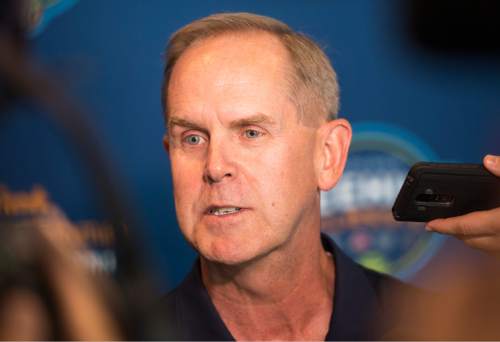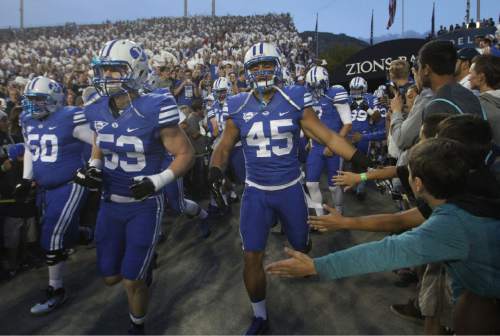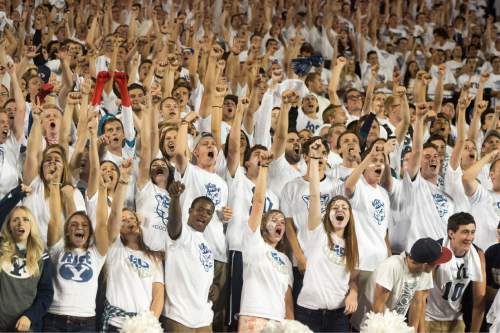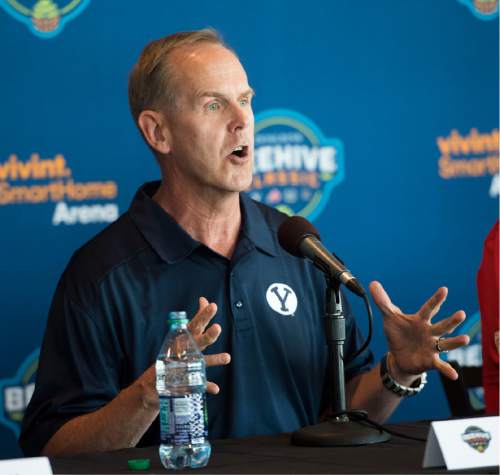This is an archived article that was published on sltrib.com in 2016, and information in the article may be outdated. It is provided only for personal research purposes and may not be reprinted.
With the Big 12 opening the door for conference expansion this week, BYU athletics director Tom Holmoe is ready to do everything he can to make sure it doesn't close this time without the Cougars getting inside.
"This is something that's been a long time coming," Holmoe told reporters last week, "and now we're trying to put our best foot forward."
It has been five years now since BYU left the Mountain West. If the Cougars have enjoyed the freedoms of independence, they have also endured the myriad problems that have come along with it. So Holmoe isn't playing coy about the chance to get his university into a Power 5 conference.
"I don't think there's any secret that this has been a desire for a long time," he said. "We've always wanted to play at the highest level we could for our players. When I watch our football team, our basketball team and all our Olympic sports have a hard time getting games against Power 5 schools in nonconference play, it's tough for all those sports. Now, just to have the opportunity to play those teams in a regular season, in a conference schedule, I love it."
After some lukewarm looks in the past, the Big 12's board of directors gave commissioner Bob Bowslby an edict to "actively evaluate" the interest of schools for expansion — a move that could increase the conference's relevance and bottom line.
The Big 12 lags behind the SEC, Big Ten and Pac-12 in revenue according to the latest figures. The SEC reported more than $527 million in annual revenue, according to its latest financial fillings, compared to the Big 12's $267 million. And when the ACC announced this week its plans for a conference network, the news helped nudge the Big 12's directors toward action.
"It does indicate to us that we are continuing to operate in an environment that is filled with change; even over the period of a few days a matter can change," Oklahoma president David Boren said.
The conference's directors set aside their usually conflicting interest to vote unanimously in favor of exploring expansion, and to do it quickly.
"We want to do everything possible to put this conference in a position to play for championships, for national championships," Boren said. The president added, "If we are to expand, we want to find the strongest possible partners for expansion."
The Big 12's preliminary checklist for partners includes strong athletics, a solid fan base with a good TV following, strong academic standards, and integrity and "shared values."
A number of schools have reportedly been pitching themselves to the conference behind the scenes for some time and could pique the Big 12's interest. Memphis, Houston, Cincinnati, Connecticut, Southern Florida and Colorado State have all been mentioned as possible candidates.
But an ESPN anonymous poll of Big 12's 10 football coaches tabbed Houston and BYU as their favorites to join the league.
The Cougars in Provo certainly think they fit the bill.
BYU has arguably the best football tradition of any of the potential candidates and a 63,000-capacity stadium.
The school, however, poses some unique challenges due to its affiliation with the Church of Jesus Christ of Latter-day Saints. If an invitation ever were to come, it would need to be approved by BYU's Board of Trustees, a group comprised largely of church authorities. That might not be a slam dunk; recently, church leaders have done away with the athletic programs entirely at BYU-Hawaii, having done the same thing earlier at what is now BYU-Idaho. The school also refuses to participate in athletic events on Sunday, though that may not be an issue if the Big 12 accepts new football-only members.
Holmoe told ESPN.com that joining as a football-only member is a consideration, though not necessarily a preference, and that the school's no-Sundays rule could be resolved with the league in some fashion.
"We're obviously open to listening to what they want to do. We're going to go through this process with an open mind to listen to what they have to say," Holmoe told the website. "I believe that's something that can be worked out. We've been in a lot of leagues through the years, and we've been able to work it out."
On the other hand, that same affiliation with the church gives the Cougars a national fan base. Meanwhile, bringing Provo into the Big 12 might help the conference's recruiting efforts creep east. And, because of its independence, BYU might also be a cheaper option than some other candidates whose conferences could command eight-figure buyouts if they were to leave.
"We've got a long way to go to prove our point," Holmoe said, "but we're going to get after it."
BYU, of course, has been left waiting on expansion before.
"I just tried to keep our focus on what we can do, and what we can do is … have our teams play well," Holmoe said. "The reason we're in this discussion at all is because of the history of BYU athletics. These players and the coaches and the teams have put together incredible seasons year after year, decade after decade. Living in the intermountain west, sometimes it doesn't go noticed. But the fact that we can have an opportunity right now is a credit to all the people that have done the work in the past."
Now Holmoe has more work to do.
Tribune reporter Brennan Smith contributed to this story.
Twitter: @aaronfalk The other contenders
Boise State • One of the first "BCS busters," the Broncos have defied the odds before, but the Big 12 seems like a bigger leap than the distance between Boise and Lubbock.
Houston • This program makes the most geographical sense, brings a massive TV market and gives the conference a stranglehold on the Lone Star State.
Memphis • Trending upward in football and has an established basketball program. The Tigers are also in the thick of SEC country.
The Florida schools • UCF and USF have been entertained as options to give the Big 12 a presence in Florida. But can the conference admit a team with a lack of football history?
Colorado State • The Rams will be playing in a new stadium in 2017. But while Denver is a top-20 TV market, the Rams don't have a serious hold on it.
Cincinnati • The Bearcats have made major bowl appearances in the past, but their 40,000- capacity stadium would be a small venue in the Big 12.
UConn • The Huskies have a rich tradition on the hardwood, but when it comes to football they don't bring much to the table. Geography might also be an issue.











